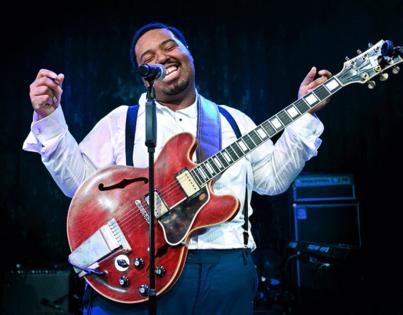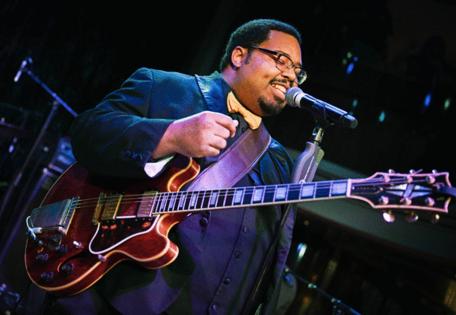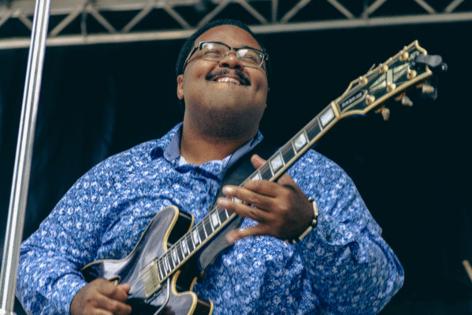Young music phenom D.K. Harrell lighting up the blues: 'He has this electricity'
Published in Entertainment News
SAN DIEGO — At just 27, fast-rising blues dynamo D.K. Harrell is probably a bit too young to be the subject of a feature film. But so many aspects of this Louisiana native’s life are worthy of big-screen treatment that it may only be a matter of time before Hollywood comes knocking.
Harrell, who performs May 11 at San Diego’s four-day Gator by the Bay festival and June 6 at the prestigious Chicago Blues Festival, did not embark on his first concert tour until last year.
That was one year after his chart-topping 2023 debut album, “The Right Man,” was released by the nonprofit record label Little Village. Harrell’s car was repossessed five months later — at the very moment he was accepting his NorthEast Louisiana Music Award as Entertainer of the Year.
“I didn’t know they’d repossessed it until I came out to the parking lot after the ceremony,” Harrell said. “At least I got an award out of it.”
Harrell was homeless at the time. He had been living in his car for the past year. It contained all his belongings, including his clothes, guitars, amplifier, and more.
“D.K.’s car was repossessed three days before he was leaving to perform in Europe for the first time, and it was a nightmare,” recalled his manager, San Diego Blues Festival founder Michael Kinsman. “He went to the impound yard and had to convince them to let him get his passport and wallet out of the car.”
Harrell made his flight to Switzerland. He arrived at the 2023 Lucerne Blues Festival as a complete unknown. Two electrifying performances later, he left the Swiss city as a conquering hero with bookings to return for performances at nearly a dozen 2024 music festivals across Europe.
It was just one in a continuing series of heady accomplishments for this charismatic young singer, guitarist, songwriter and band leader. A late bloomer, Harrell did not perform in public until he was 21.
But when he did make his debut, it was at a talent-packed concert that Eric Clapton was scheduled to headline during the 2021 B.B. King Day Symposium at Mississippi Valley State University. Clapton was a last-minute no-show, but Harrell rose to the occasion and then some.
What’s more, before he performed his impassioned version of King’s signature song, “The Thrill Is Gone,” Harrell was handed King’s famed Gibson ES-335 guitar, Lucille. It is the same instrument King immortalized with the 10-minute title track of “Lucille,” the blues giant’s 1968 album.
“Oh, man! It was a very out-of-body experience. It was so overwhelming,” Harrell said of his Lucille moment.
“I remember holding the guitar in my hands before I went on stage and thinking of the good things and bad things I’ve been through, and about how my father never really supported me doing music. I shed a few tears and kept in mind that this is a good thing I’m doing. I went up there and played his guitar, after just having met B.B. in 2013. It was almost like a too-good-to-be-true moment, like: ‘This can’t be real’.”
What made this even more of a pinch-me moment for Harrell is what a dramatic role “The Thrill Is Gone” played in his life when he was still a toddler in his hometown of Ruston, which is known as “the peach capital of Louisiana.”
The thrill is found
As a baby, Harrell was nonverbal. He didn’t speak. He didn’t cry. He didn’t make the sounds that nearly all infants do. He was so quiet his aunt thought he was mute.
That all changed, thanks to B.B. King. Or, rather, thanks to King’s timeless music.
“One day, when I was nearly two years old, my grandfather gave my mother the CD of B.B.’s (1997) ‘Deuces Wild’ album,” Harrell recalled. “He said to her: ‘If you play this while you guys are driving to Shreveport, he’ll be good.’ She did, and I began to sing along to one song.
“My mother couldn’t understand it because I was such a quiet child. The story is that when I started to sing, she almost crashed the car because she was so excited her baby boy was singing.”
Exactly which King song from “Deuces Wild” did the then-pint-sized Harrell sing along to?
“Honestly, it was ‘The Thrill Is Gone’,” he replied.
Harrell was 14 when he saw King perform for the first and only time. It’s an experience he recounts as if it took place just last week.
“Yes, sir! It was Jan. 19, 2013, at the River Center Theater in Baton Rouge,” Harrell said, his voice dancing with delight.
“It was a clear night and I wore my grandfather’s leather coat because it was a little chilly. My hair was in in a perm and conked to look like how B.B. had his hair back in the 1950s. We sat in Row S and I had a clear view of B.B., no heads in the way. Lil Ray Neal, Kenny Neal’s brother, opened up the show.”
Did Harrell come close to levitating when King, who was then 87 and in the twilight of his career, performed at that Baton Rouge concert?
“Oh, man, I should have been. But I guess I was too heavy!” he said.
“I was so excited to hear B.B. play and sing in person, and I was screaming and shouting all night. The real highlight was after the show when I asked my mother if she wanted to go down in front of the stage after the show and meet him. She said: ‘No, but you can go meet him.’
“So, I made my way down, and said: ‘Mr. King! Mr. King!’ He looked at me with a big smile. I said: ‘I was the young man back there shouting and hollering.’ He said: ‘Yeah, I heard you.’ I said: ‘I want to be just like you!’ And he said: ‘Well, I don’t know about that since I’m in my 80s. But always be yourself and be good at whatever you do.’ He stuck his hand out, and I shook it and thanked him.
“By the time I got to the exit door, I was crying. My mother asked me what was wrong, and I said: ‘I met B.B.! I met B.B.!’ “
King, who died in 2015, often tossed his guitar picks to audience members at the conclusion of his concerts. Harrell did not get a pick that night in Baton Rouge. But he did get more than that than a decade later at the B.B. King Museum & Delta Interpretive Center in Indiana.
“They gave me one of B.B.’s custom-made shirts that he wore on stage,” Harrell said.
“The crazy part is that, inside one of the pockets, were three of the guitar picks that he would throw out to the audience. I guess you can say B.B. gave me a guitar pick, at least in theory.”
Blues via YouTube
Harrell was born in 1993 and his devotion to the blues is palpable. Blessed with a robust voice and a no-nonsense guitar style, he makes each note he sing out strongly whether it’s coming from his throat or the strings of his guitar. His music is steeped in tradition, while imbued with a freshness and vitality that is earning him young and veteran blues fans alike.
Apropos of the era Harrell grew up in, he learned how to play the blues long distance, using his computer to connect him with the music of such giants as King, John Lee Hooker, Howlin’ Wolf, and more.
Rather than just listening to King’s trademark vibrato on records, Harrell had access to numerous live-performance videos of King on YouTube. Watching and studying them enabled him to see and learn exactly how King achieved that vibrato with fingers and carefully honed six-string technique. Using the music of his idols as a foundation for his own, Harrell is well on his way to forging a distinctive style of his own that draws from both blues and funk.
“DK’s artistic growth as a live artist has been amazingly quick. He has this electricity,” said Alligator Records honcho Bruce Iglauer, whose label will release Harrell’s new album in June.
“And he taught himself blues, all by himself. D.K. wasn’t surrounded by a lot of older blues artists growing up. He just fell in love with the music. Weirdly, he began by watching videos, primarily of B.B. He developed from the inspiration B.B. gave him, but D.K. doesn’t sound like B.B. He did, early on, but not anymore.”
Harrell regards his YouTube-fueled exposure to blues as a distinct advantage.
“I guess you can say the younger generation has the upper hand when it comes to learning,” he said.
“Of course, I’ve heard about how people who had to learn from records needed to keep putting the needle back to listen, over and over. Now, we can see how it’s done. I can’t control time or technology, but it is of great benefit to me. I’m more of a visual learner than I am by just listening to music. So, if I can see someone’s hands on the guitar, I have a visual of what they do.
“The older cats really had to use their ears to learn music. But there are lots of recordings that just have audio, no video, so we are still learning some music just by ear.”
Harrell’s stinging guitar work is distinguished by its focus, concision and use of space between notes. His solos are lean, to the point, and use dynamic tension and release to make maximum impact.
“A lot of guitarists like to shred and pay a lot of notes very fast,” he said.
“But people like B.B., T-Bone Walker and Lowell Fulson took their time when they played. And my grandfather always told me you should use your time wisely. So, when I’m playing, I take my time. You don’t have to rush it. Even if it’s an upbeat shuffle, I can still take my time and still feel as good as if I’d run a marathon.”
There is another ingredient that gives Harrell’s music a distinctive edge.
His singing and guitar playing reflect not only his passion for blues but also for the gospel music he grew up hearing and performing in church.
Or as T-Bone Walker sang in his immortal “Stormy Monday”: Saturday night I got out to play/ Sunday I go to church/ Gonna kneel down and pray.
For Harrell, blues and gospel are mirror images that draw from the same aural motherlode.
He reinforces this point on “Praise These Blues,” a standout song on his upcoming new album that combines gospel fervor and blues power into a mighty whole. It includes such heartfelt couplets as: Some people say the blues is the devil’s music, but I don’t believe that it’s true/ Because it will lift your spirits and feed your soul/ Just like the gospel and the lord can do/ I love the church and I love the juke joint/ And you can’t make me choose/ Get your hands together and praise these blues.
“I tell people all the time that gospel and the blues are really not far from each other, especially on a technical basis when it comes to chords,” Harrell said. “Ray Charles is a great example of taking gospel songs and turning them into R&B, like he did with ‘I Got A Woman’ and ‘Hallelujah, I Love Her So.’
“A member of my church told me last year: ‘D.K., you can’t play in the church if you play the blues; you have to choose.’ I respect my elders. But at the same time, I think God can give you gifts and you can utilize them inside and outside the church. So, the way I look at it, church and the blues are the same thing. We’re all just living. And you are living the nucleus of the stories you tell, both in church and the blues.
“I see my singing voice being like the pastor and the guitar being like the congregation. I sing something and then the guitar agrees, like: ‘I’m feeling what you’re saying.’ And sometimes in this world, when we don’t have friends or family, sometimes, all we have is music.”
James Brown, Ray Charles
Harrell’s zeal for music began even before YouTube became a dominant force for young people in much of the world.
He was inspired by several movies as a kid, including the Ray Charles biopic “Ray,” the James Brown biopic “Get On Up,” and by “Cadillac Records,” which chronicled Chicago’s Chess Records, whose roster included Muddy Waters, Buddy Guy, Etta James, harmonica master Little Walter, and other blues icons. (Harrell’s first instrument was a harmonica, not a guitar.)
After seeing “Get On Up,” which featured “Black Panther” star Chadwick Boseman as Brown, Harrell began wearing his hair in a Brown-styled pompadour. This led to him being made fun of in school, where his young classmates also looked askance at his preference for vintage blues and soul music over hip-hop.
But Harrell was unwavering in his devotion to the music that would change his life. It provided solace for a kid who was picked on for his appearance, his musical preferences and his weight.
“When I came into my classroom and played songs by B.B. King, they looked at me like: ”What?!’ They weren’t fond of me,” he said.
“Now that I’m starting to get established and they hear how I mix traditional blues with a contemporary sound, they’re starting to appreciate what I do.”
That appreciation is beginning to extend far beyond his high school alma mater.
“When D.K. played in Switzerland at the Lucerne Blues Festival, people were literally shouting his name in the streets afterwards when he walked by,” said Kinsman, Harrell’s manager. “It’s astounding how quickly things have taken off for him since then. I’m just riding his coattails, no doubt about it. He’s an extraordinary talent.”
Kinsman, a former San Diego Union-Tribune staff writer, had years of experience as the founder and producer or the now sadly defunct San Diego Blues Festival. But he’d never managed an artist until after hearing Harrell perform at the 2022 International Blues Challenge in Memphis.
“D.K. was in the finals and I was impressed,” Kinsman said. “He contacted me a few months later through a mutual friend. We talked a bit and he’s very smart and intrigued me. We kept talking and, in May of 2023, he asked me to be his manager.
“I didn’t know anything about management. But I knew the business, at least more than he did, and I had some contacts. I knew D.K. needed help and that I wouldn’t screw him over, so I agreed to help him on a temporary basis. I figured I was good for maybe two or three years and then turn it over to a real manager. But things have been going so well that I don’t see any real end in sight right now.”
Alligator Records’ Iglauer points out another factor.
“D.K.’s mother raised him and, just two years ago, he was homeless,” Iglauer said. “D.K. needed a father figure, and Michael has really risen to that occasion. Michael is a great manager who I really respect. He’s still learning, but he’s not afraid to pick up the phone and talk to me or other managers.”
Harrell agreed.
“Michael’s not only my manager, at times he is a father figure. And I have to say that, even though we have our moments of disagreement, at the end of the day I have a love and respect for him. He’s not like any other person I’ve ever encountered. I know that when he leaves this Earth it will hit me very hard, because I really love Michael and everything he’s done for me and my band.”
Harrell’s superb new album, “Talkin’ Heavy,” will be released June 21 by Alligator, which was founded in 1971 in Chicago and is the world’s preeminent blues record label.
As impressive as his 2023 debut album is as a very promising work by a young new artist, “Talkin’ Heavy” is all the more assured and accomplished. It is a strong statement of purpose from a rising star whose potential is undeniable. And some of its songs earnestly chronicle the trials and tribulations he has undergone, as well as his recent triumphs.
“We played at Pennsylvania State University recently and there were so many young people at our concert, students in their teens and even as young as 12,” Harrell said. “Afterwards, they were coming up and saying: ‘I never liked the blues until I heard you.’ That’s when you know you are doing something right, when the younger generation comes up to say: ‘Thank you’.”
©2025 The San Diego Union-Tribune. Visit sandiegouniontribune.com. Distributed by Tribune Content Agency, LLC.


















Comments